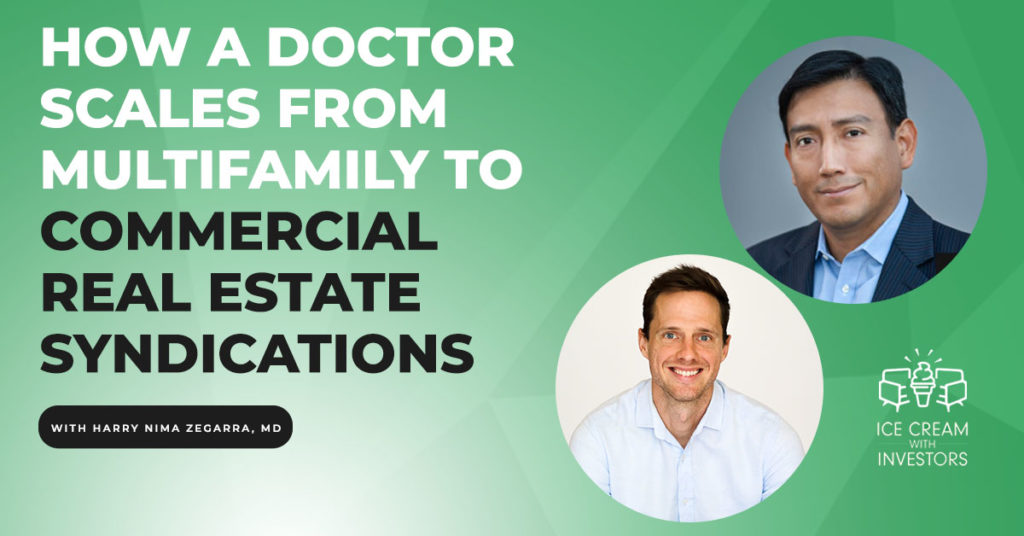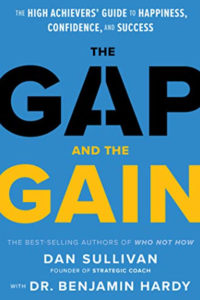One of the great things about real estate is how it provides you an avenue to generate income on the side while still working on other things. For our guest in this episode, that happens to be working as a doctor. And he found his second passion in real estate. Join Matt Fore as he interviews Harry Nima Zegarra, MD about going into real estate while working in medicine. Harry is a critical care and pulmonary medicine specialist and a real estate investor, business owner, and co-founder and manager of NIMA Equity. He shares with us how he fell into multifamily syndications and how hiring a property manager helped him scale his business to the commercial side. Harry then offers some insights on finding markets and properties. If you want to know the secret to how Harry balances it all, tune in to this great conversation!
Guest Links:
- www.nimaequity.com
- https://www.youtube.com/channel/UCBYyErh18CHP_78YzuNoKqg
- https://www.facebook.com/nimaequity/
- https://www.linkedin.com/company/nima-equity/
—
Watch the episode here
Listen to the podcast here
How A Doctor Scales From Multifamily To Commercial Real Estate Syndications With Harry Nima Zegarra, MD
In this episode, we have Harry Nima Zegarra. Harry is a Pulmonary and Critical Care Medicine Physician, real estate investor, entrepreneur, and Cofounder and Manager of Nima Equity. It is a firm focused on commercial real estate syndication, where he helps physicians who earn passive income, lower their taxes, and achieve financial independence. Harry has experience in rental properties. He owns and manages nine properties across the DFW area. He is also a general partner in 784 units in four different states.
—
Harry, welcome to the show.
Matt, how are you? Thank you so much for having me. I’m very excited about this episode.
We like to start with the difficult questions here. What’s your favorite ice cream?
Anything that goes with vanilla, like vanilla with chocolate chips or M&M’s. I discover the sea salt caramel or dulce de leche as an extra flavor. I love it.
I am on a big salted caramel kick right now. I was chatting with you before the show. I got back from a beach and had a big cup of sea salt caramel. It was delicious. Tell our readers, what’s the scoop? What do you do now?
As many people may know, my wife and I were both physicians. I’m a pulmonary and critical care doctor, and I still work right now. My wife is a family doctor. Apart from that, we have our second passion, which is real estate. We do residential real estate, and in the last couple of years, we have been doing commercial real estate, mainly in the syndication space.
Take us back to the beginning. Where did your real estate journey begin?
We’re from South America. We both are from Peru, my wife and I. We came here a couple of years ago and we were physicians already. We had finished our medical school and were coming to the US to do extra training, residency, and then sub-specialty. We had some background already about real estate, more in my family. My mom got divorced when I was very young. We were living with her, and she needed to do many things to bring the food to the table. She had several ventures in businesses, and one of them was in real estate. She bought a small property that was still in construction. After a couple of years, she finished the construction. It was a small hostel or a hotel. It took 3 to 4 years to finish that. She is still holding that for many years. It’s been a while.
What happens is we came here to the US. I had witnessed in the past all the benefits of real estate, of course in South America and Peru, but it has some parallels here in the US. We were very interested in that. You can imagine that you’re still in training. My wife and I didn’t have enough time. It was an important time to focus on medicine around that time. We couldn’t start four years after we came. We were moving to another city because I needed to continue my training and we didn’t want to rent. We did want to save some money and like to start building up some nest egg or equity in something.
We decided to buy a townhouse, and it was in Richmond, Virginia. I was at the beginning of my fellowship. It was around 2011. 2012 was the lowest market in real estate, but we bought that and we’ve been living there for three years. After three years, as the nature of someone who has training in medicine, you get to move to another place, so we decided to sell the property. We were very surprised by how it was appreciated. It had appreciated 30% or 40% around that time, so we’re very excited. We then moved to South Texas, where I initially worked in private practice. We were considering building a house, so we bought a piece of land.
We do not look for the perfect house. We look for a house that makes sense in numbers.CLICK TO TWEET
In the end, we didn’t stay there because we moved to Dallas. Before we came to Dallas, we also saw the lot. We also appreciated it a lot in a matter of a year and a half or something. We arrived in Dallas and we fell in love with the area. We decided to stay and buy our residence, where I’m living right now. Probably 2 or 3 months after that, we started deep into real estate and investing.
I want to go back to your mom buying a construction based in Peru. Did you help her construct that? Did you work at it once it got constructed? What was your involvement look like there?
When she bought the property, I was too young. I believe I was in my teens, 15 or 16 years old, but I wanted to help out in some way. I was the person who was at the front desk, helping everyone who would come back to the property and want to stay for a night, weekend, or something like that. It was a good location because it was two blocks from the hospital. It was a very busy location.
Is that the only property she owns?
She still owns that property and has two more small apartment units.
What does she think about your real estate endeavors?
She is excited. As we all know, all moms are nuts. She sometimes tells me, “You spend so long and so much in medicine, and that’s your career.” I agree with her. I still love medicine and my wife is the same. At some point, we found ourselves that we needed some extra help. We found that we do something we were both vulnerable if you only have one strain of income.
Especially in these last couple of years, these humble all of us with the pandemic and all of that. Some people were not able to work. You can imagine the case of my wife and I. We were front healthcare professionals, so we were working every day. We were exposed to COVID and the dangers of it. If something happened to me and my wife, we would be in real trouble if we didn’t have other sources of income.
I want to get into how you balance all that, but before we get there, your place in Richmond, did that thought ever come to your mind about renting that out? Was it, “We bought this as a temporary for our residency, and we’re going to sell it and move on?”
None at that time, but now it comes back to me all the time. I shouldn’t have sold that property.

Real Estate Syndication: If you give it enough time, real estate investments will be good investments.
You moved to Dallas, and you bought a home. How did you learn about real estate then? I’m assuming you knew about it because of your mother, but how did you start learning that you can be an investor as well?
I had been studying, learning, and doing research for a long time. It started at the end of my last year of fellowship. I had about 4 to 5 years to get ready before I started my first investment property, but I wish I had started earlier. As we were moving very often, I couldn’t find myself doing that initially. When we came to Dallas, we had been reading books, audiobooks, listening to podcasts like yours, and going to websites like BiggerPockets, and things like that. We have a good level of education already on that, but we need to take action or take the next step to get into that.
What was your first investment?
As I mentioned, we arrived in Dallas. We love the area. We decided to settle. After a couple of months, we had a very good friend, where one of the parents was on our kids’ basketball team. She’s a realtor. She was super nice and patient with us, especially with investors, because we were not looking for the perfect house. We look for a house that makes sense in numbers. We went with her and we decided to buy. Our first property was direct from the MLS. That was around 2017 and 2018, where the market was harder and too expensive.
Our first investment in terms of numbers may not have been a home run or the best investment ever, but for my wife and I, it was the best investment because it was the way we started in real estate. It was our first step into this. In MLS, you don’t get that big discount, and the same with a realtor. We even decided to buy cash because it was competitive and we didn’t take a refinance initially at that moment. The numbers were not that great. Even after that, after a couple of months, the AC broke.
We saw all our cashflow in the first six months or the first couple of months went away. We were talking to each other and saying, “This is the worst investment that we have done. What are we doing here?” It takes some patients and some time. What happens is that many people who start in real estate don’t realize that this is not a get-rich-quick thing. You don’t see the results in months, even the first year. It’s a really good investment and a great way to build wealth, but you need to be patient with that.
Real estate is a get-rich, slow scheme. I see a lot of similarities in our stories. I’m going to ask you some random questions. Was that home near where your primary residence was?
It was relatively close. It was probably half an hour from where I live. If you talk about big cities like Fort Worth, that’s closed.
Was it newer built? Do you remember when it was built?
It was built in 1985. We looked specifically for a Class C property, in the middle, not too expensive, not too cheap, so we would have a good tenant base. For people who would work, we’ll try to get a good place for their families to live. We haven’t had any problems getting tenants because it’s so much in demand.
Many people who start in real estate don’t realize that this is not a get-rich-quick thing. It takes time and patience.CLICK TO TWEET
The reason I say our stories are similar is because I did the same thing. I studied and bought it off the MLS, but it was a new building right around the corner. My thought was eyes and ears on the property. I managed it myself. My understanding is you manage that property yourself as well. Little did I know that I didn’t know the first thing about being handy on a property. It could be in Alaska and I would still have the same impact if something needed to be done. You’ve talked about that you try to manage it yourself and then you’ve got a property manager at your first property. What were some of the struggles you had as you learned to property manage it, and why did you ultimately decide to get a property manager?
There’s no time off for you. If you’re the property manager, you’re there 24/7 for any problem and question that the tenant would have. We had several small problems, like 3 or 4 problems over a span of 7 months. Even though it doesn’t sound to be that much, my wife and I are both full-time physicians around that time. It was stressful. We wouldn’t find the time to do all of that. On top of that, I have two kids. Now they are very active in their school. They do sports and all of that.
They have parties even more than my wife and I now. They’re more social than us, but it was something that sustained. After seven months or so, we decided to get and hire a property manager, which changed everything because we were able to leverage someone’s expertise in managing a property. The money that we were paying that person doesn’t compare with what that person freed for us, like the time and the peace of mind that you are able to do other things. That made us start scaling up our business. Until we decided to start buying properties, we had nine properties around the DFW.
That’s where I was going next. How far did you scale? You scaled the nine. Were all of those of the MLS as well? Did you have wholesalers? How did you find the next few properties there?
I started learning after that. We met this property manager. He had experience in off-market properties. I’m a very curious person, so I always asked him about these other ways to acquire discount properties. In the MLS, you couldn’t find a good deal that makes sense in numbers anymore. I joined several Facebook groups about wholesaling. I was going to meetups and doing a lot of things in order to get out with the property. We started getting off-market properties. It’s a property that, for some reason, needs to be sold quickly in a month or less than a month.
Either because the person who is selling needs the money very quick or their property cannot be financed in a regular way. We started doing that. We already had some education about that. I was also using the help of my property manager who would come with me and check on those properties. I’m not an engineer or a contractor.
I’m a physician. I wouldn’t know how much the flooring to be replaced, or if we had a problem with a rule for a foundation, they’d be fixed. He would know that. We would go and make our calculations and all of that. Initially, it was a little bit riskier at the end because I had already experienced it, but it made sense. We jumped in that second way to find properties, and it worked very good. We use the BRRRR method, so we bought those properties cash. We do the renovations. We put a tenant. We did the refinance, and then we will repeat everything.
Only because I know the answer through some podcasts I’ve heard you on, but what did you learn through the buying of distressed properties that you wish you would have known going through that process?
It’s like opening up Pandora’s box. The wholesalers are good people and they do their function in real estate. They’re very important. They help people like investors and also sellers. They don’t always have all the information, so you need to have knowledge about how much things cost and how to spot things that need to be replaced or repaired. It’s because it may be the case you’re going into a property, you’re buying the property, making your numbers about how it’s going to be in the renovations, and all of that. It’s nothing like that. It’s $10,000 or $20,000 more, or sometimes even more, and then there are other surprises that you’re going to find.
It’s a little bit risky, but at the same time, it can get you good returns. It happened to me when one of the stories that I always tell. I was getting better at making my numbers and the budget for the repairs and all of that. At some point, I started buying a property site and scene. I was making relations that were getting more comfortable with different wholesalers.

Real Estate Syndication: If you want to go into commercial real estate, you need one of these three things: time, a good network, or capital to invest in yourself.
One that came to me was selling this property that was a good price. He said, “The property would need probably $15,000 to $20,000 in renovations or repairs.” For the size of the property, it is reasonable. When we bought the property, we go in, and I was like, “It was over $30,000, at least.” Thankfully, we have the means to deal with that initially. In the end, it was a very good investment. I believe, and we talk about it, most real estate investments, if you give it enough time, will be good investments.
I like to say every real estate investment if you give it enough time. The problem is I can’t tell you how much time you have to give it. You might have to give it 1,000 years. Where are you buying these properties? Is it from the same wholesalers, or were you going to multiple different wholesalers?
Different wholesalers. That was my to-go person, but in general, I would go to different persons.
When you were going through that phase, was there anything about a house that would make it at no buy from the start? When I was going through this, I had the criteria that said, “If it had these issues, I wouldn’t buy it,” because I didn’t have the knowledge to work through those kinds of issues.
Initially, I didn’t have any problems with any property, but then, I started getting better. I wouldn’t buy properties that were built before 1980, for example, because of the construction issues from the beginning. In some states, like in Texas, when you go and see foundation problems, it’s a big no. If you live in Texas, every house has foundation problems. It wouldn’t be for us. We have the professionals that take care of that. We learned that there was nothing really specific. If the property has some additions, we would come and do a better assessment and evaluation of however the additions have done. Other than that, we were looking mainly at the year of construction.
I’m going on a little tangent here. Mine was 1980. Before, I usually wouldn’t touch those. That’s specifically because of the lead paint and some electrical issues that you have to worry about. Foundation issues were something that if you can fix a foundation issue, there’s a lot of margins and fixing those problems. I don’t know what I’m looking at when I look at those kinds of issues, so that’s not for me.
HVAC, windows, and roof are your big things beyond the foundation. You can almost solve anything in a house for less than $30,000 unless you’re dealing with a 1904 bill that has crazy plumbing and wiring, etc. You scaled it up to nine. You and I were at the same number. I was at 10 when I decided to jump into multifamily. Why did you decide to make a move and go through that?
One of the things is that the residential properties were getting more expensive in this area. I started a couple of years ago. I started in commercial in 2020, where the properties were getting more expensive in the DFW. We started going outside, like the main area. My last property is located in Keene, and Keene is about 25 minutes South of Fort Worth. I was getting farther in order to get a property where the numbers would make sense. I don’t need to go every day, but to see the property the first time and a couple of times with the contractors, I needed to go at least a couple of times.
It would take me at least over an hour to go there, so it was getting more difficult. The other thing is, even having a property manager, you are responsible for properties, and that takes a lot of time. I find myself that every week, I’m talking for at least one hour with my property manager, or sometimes more when there are problems about different things that may show up with properties. At the end of the year, there is a lot of paperwork and homework that you need to do.
In terms of the mortgage and taxes, you need to pay them before December. If you want to make improvements to the properties, there are a lot of things to do. The other thing is that any problem or any decision that you need to make, all the responsibilities are on you. Even if the property is an LLC, you’re still responsible for all these properties and your tenants. At that point, it was becoming too much. We decided to shift gears and look for another type of investment in real estate that would feed more with our lifestyle.
Don’t try to find happiness in the future. Happiness is inside of you. It is now. It is at this moment.CLICK TO TWEET
You hit on a number of different issues like property management scale. The tax benefits of single-family aren’t as great if you’re over $150,000 in terms of your active income because it doesn’t make sense to do the cost segregation and bonus depreciation. Some might argue there. I’m not an accountant, but it doesn’t make too much sense there. Did you get involved in multifamily as a passive investor first, or did you jump right into capital raising and being general partners on deals?
I went straight to being an active syndicator operator.
Was that a good move, or do you wish you would have gone the LP route first?
For a good couple of months, at least six months of research and education, I had gone this several meetups and conferences too. From many operators, they were like, “You can start passively, but if you have the means or the time that this gets started actively, why not?” I had a little bit of my background already in real estate in residential. Of course, it’s completely different, but they knew already that I could accomplish things. To be able to scale in a couple of years to nine properties, they saw some potential in me. That’s why I started actively initially.
I started as an LP. I’m an LP in a number of different funds and investments right now. One of the things that I liked about it is that it changed my mindset. Seeing a $300 check for your residential where you have to be more hands-off, deducted, and make sure you’ve got the automated bill pay set up, property management communications, etc. A $300 paycheck from a passive investment, knowing that you did absolutely nothing for that, shifted my mindset a little bit to the benefits of being an LP. That’s why I asked that question to see your experience.
In our case, we also invest passively in all the projects that we go after. I started seeing all my checks from my passive investments, even before my active investments, so it was great.
Your portfolio now is across four different states with 700-plus units. Where are you focused right now? Do you have a state or a market that you’re interested in? I know the group that you’re a part of. I hear great things from that group, specifically the leader of that group. Are you helping where they find deals? Talk us through how you are finding your markets and your properties.
One of the things when we decided to go into multifamily and syndications, I talked with different people who have been in the business for a couple of years. One of them, who was very smart, told me, “If you want to go into commercial real estate, you need one of these three things. You need either time, a good network, or have some capital to invest in yourself.” With the time, I didn’t have the time already because I’m a physician. I have my house and my kids. In terms of network, I have a good network of friends, physicians, and family, but I didn’t have a network of commercial real estate investors or vendors.
I have some capital, so I decided to invest in myself and join this mastermind and mentorship where I could meet other people who were there in the business for years, and many of them were doing this full time. My group and also our company, where do we focus on? We focus mainly on the Southeast and the Midwest. In the last couple of years, we have seen most migration, job creation, and diversity. These are specific states. Also, there are very friendly entrepreneurs for businesses, and they’re landlord-friendly. We have all the perfect set up in this market. That’s where we focus now.
I don’t want to breeze over the point that you said whenever you’re doing real estate, you either need time, money, or network. For most people that are getting involved in this, there’s no way you can have all three. If you have all three, that’s great. Chances are you don’t have all three, but you better show up with one of them.

Real Estate Syndication: It’s not that you put your money or capital and things are done. You need to do your work.
If you don’t have any money, at least be a broker of a network. If you don’t have a network, then have the time to get involved with other people to be their hands on a keyboard or do activities they need. I love that you mentioned that. You’re a guy with a lot of things going on, a physician by day, super parent by night, multifamily syndicator, and an active real estate investor. I’m interested in how you balance all of that. Any tips or tricks you can share with us on how you’re able to juggle so many different things at a high level.
You need to remember I come from a house with a single mother that raised my sister and I. I always find myself very humbled by her story and saying, “If she could do it that she didn’t have much help, why I wouldn’t be able to do it?” She didn’t have the opportunity to go to college. She was a hairstylist. Also, I always feel like if there is a wish, there’s a way to do things. I have a great advantage. I’m married. I have a great wife. She is my friend, and we can talk every night and share the responsibilities that we need to do, especially here at home.
We always talk about our profession, investments, and all of that, but the most important thing is that we’re family. If we’re able to be great here at home, we have everything covered, are in good health, and get along well, and the rest is easy. We find the time. For single-family houses, I’m able to leverage the expertise and the time of my property manager. For the hospital, I have been in many years in medicine. I wish to believe I already have figured it out to some degree. In commercial real estate, it’s something that we’re passionate about that.
We know when we started this journey in 2020 in this mastermind group, we knew that it’s not that you put your money or your capital and things are done. You need to do your work, homework, and hustle because no deal is going to come to you and make you money. You need to bring value to other people, so that’s what we did. We started connecting and networking with other people inside the group.
Because we had our mentor and the senior of the group that we trusted already, we felt he trusted other people inside the group and wanted to keep inside the group so we could have good partners there. We started going immediately after two weeks that we joined the group. We went there for due diligence on a project outside Kansas City. A week later, we were already in the team and the general sponsor team. That was the first property that we acquired as a general partner.
First off, I want to say to your mother, bless her. Being a single mom is probably the hardest job in the world. I would beg for somebody to bring me an example of a more difficult job than that. Second of all, it sounds like you and your wife are very actively involved in real estate investing. Was she always on board with this? Was this your thing? Was it her thing? Had she dragged you along, cricketing, kicking, and screaming to get involved in real estate? How do you all communicate as a couple about investing in real estate?
We have had several talks about it almost every night. In the relationship, I’m more like the person who is the dreamer, who thinks ahead 1 or 2 years. She is more like the person who is trying to tell me, “Harry, let’s go slow. Let’s go step-by-step and be conservative in all of this.” We have a good balance. She also knew about real estate and my story with my mom, and I loved that and had faith in this business.
To be in sync with what to do and what steps to take, she was always on board. She stopped working in November 2021 because our investments were doing better at this moment, so she could put more time into the family and our kids, which is great. She also now supports me a little bit more in real estate. We’re doing great in that sense.
Harry, this has been a fantastic conversation. I want to switch us now into our last round. We’re calling this the Five Toppings. The first one is, what is your favorite book, or what is a book that you’ve read that’s given you a paradigm shift?
In one of our mastermind meetings, we had this topic about the book, The Gap And The Gain. I’m not sure if you have heard about that. It’s by Dan Sullivan, which is a motivational coach and a business coach, and Hardy. The book is great and has changed a lot of my mind. It talks about how many successful people, entrepreneurs, and high-achieving people aim or struggle to find happiness. You always try to go there. You’re maybe not able to get there, but the main statement or idea of the book is that don’t try to find happiness in the future.
if you’re not honest, if you don’t have integrity, nothing else matters.CLICK TO TWEET
Don’t try to pursue that. The happiness is inside of you in this moment. Many times, we compare ourselves with our ideal or with people in the same field who are doing great. We may not know that they are years ahead of us because they have a story years ahead of us, and we get frustrated and struggle with that. You don’t need to compare with your idea or what you want to do in 1 or 2 years. You need to compare yourself with your past and start from a place of gratitude. Being grateful for all the things you have done and accomplished, and also all the things you have. It has been a great book. I really enjoy it. I read it already twice.
That’s the book that my coach every week tells me I need to read. The thing I struggle with the most is talking to folks like yourself thinking, “Why are they so far ahead?” Look where you are now.
One of the points of the book is we are always going to get into the gap, but it’s impossible not to get in the gap. We compare ourselves with other people, but we need to try to go back in the game as soon as we can.
Our second one is that I believe the person you become years from now is directly correlated to the habits you have and the things you do every day. What are some of the habits that you have every single day?
Not every single day, but at least six times a week, or almost every day, I try to do exercise. I love running. I stopped doing that for a couple of years. After almost ten years, I ran my first half marathon in December 2021 and another half marathon in May 2022. It has been great. I’m in medicine, so I know that the older you get, the more you make expenses or spend more money on medicines or healthcare utilization. I tried to think in 20 or 30 years to be a healthy person who is able to be independent in his day-to-day things.
I’m a runner as well. I’m in IRONMAN Triathlete, so we’ll have to nerd out on different races. Our third one is, what’s the best piece of advice you’ve ever received?
I received many advice from coaches and from different people, but something very important for me was from my mom when I was very young. She was always telling me to be honest and have integrity. All the rest is important. You can be a really hard worker, good at numbers, or a great doctor. You can hustle or be great at networking, but if you’re not honest and don’t have integrity, nothing else matters. People are going to know and notice. That’s very important for us.
Your brand and your reputation are the most undervalued asset that you have. Our fourth one is, what is the thing that you’re most proud of in your life?
It’s my family. For all of us, that’s our why. That’s the reason why we wake up every morning and why we do what we do.
Our last one is, if you could sit down and eat a bowl of ice cream with anyone, dead or alive, who would it be and why?
My wife most likely. Don’t make me cry over here. As you can imagine, we also have a very busy and crazy life. We work all the time. We take our kids to school and to sports, do real estate, and all of that. We always see each other. We talk all the time together. Once a week or once every two weeks, we get a chance to go out to a movie, have ice cream, coffee or whatever, and enjoy ourselves. It’s great to have a partner, a wife, or someone with you that understands you, is in your journey, has to spend so much time with you, and going through so many things.
It’s easy to pass these ships at night, and it’s important always to have that time together. You’re the first person that said their partner basically to that answer.
I like ordinary life.
Harry, it’s a fantastic conversation. If our readers wanted to reach out and learn more about you or sign up for some of the things that you’re doing, where’s the best place we could point them to?
Our company is in real estate syndications. We mainly focus on capital raising for healthcare professionals and physicians. It is Nima Equity. We also have our YouTube channel because we also believe and are big in education, so they can find us there too.
Harry, thanks for coming to the show.
Thank you so much. I had a great time.
Important Links
- Nima Equity
- YouTube – Nima Equity
- The Gap And The Gain
- https://www.Facebook.com/NimaEquity/
- https://www.LinkedIn.com/company/Nima-Equity/
About Harry Nima Zegarra, MD

Harry Nima Zegrra is a Pulmonary & Critical Care Medicine Physician, real estate investor, entrepreneur, co-founder and manager of Nima Equity LLC, a commercial real estate syndication company where he helps physicians to earn passive income, lower taxes and achieve financial freedom. Harry has experience in rental properties and currently owns and manages 9 properties across the DFW metropolitan area. Harry is General Partner in 784 units in 4 different States.






